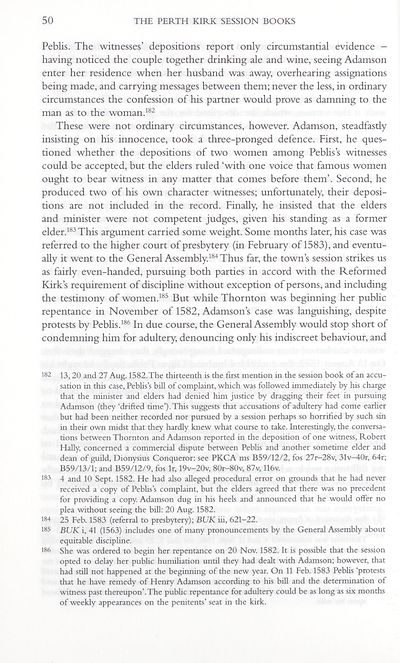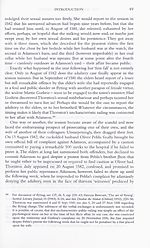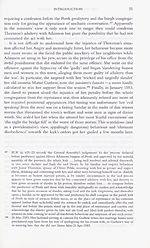Series 6 > Perth Kirk Session books, 1577-1590
(65) Page 50
Download files
Complete book:
Individual page:
Thumbnail gallery: Grid view | List view

50
THE PERTH KIRK SESSION BOOKS
Peblis. The witnesses’ depositions report only circumstantial evidence -
having noticed the couple together drinking ale and wine, seeing Adamson
enter her residence when her husband was away, overhearing assignations
being made, and carrying messages between them; never the less, in ordinary
circumstances the confession of his partner would prove as damning to the
man as to the woman.182
These were not ordinary circumstances, however. Adamson, steadfastly
insisting on his innocence, took a three-pronged defence. First, he ques¬
tioned whether the depositions of two women among Peblis’s witnesses
could be accepted, but the elders ruled ‘with one voice that famous women
ought to bear witness in any matter that comes before them’. Second, he
produced two of his own character witnesses; unfortunately, their deposi¬
tions are not included in the record. Finally, he insisted that the elders
and minister were not competent judges, given his standing as a former
elder.183 This argument carried some weight. Some months later, his case was
referred to the higher court of presbytery (in February of 1583), and eventu¬
ally it went to the General Assembly.184 Thus far, the town’s session strikes us
as fairly even-handed, pursuing both parties in accord with the Reformed
Kirk’s requirement of discipline without exception of persons, and including
the testimony of women.185 But while Thornton was beginning her public
repentance in November of 1582, Adamson’s case was languishing, despite
protests by Peblis.186 In due course, the General Assembly would stop short of
condemning him for adultery, denouncing only his indiscreet behaviour, and
182 13,20 and 27 Aug. 1582.The thirteenth is the first mention in the session book of an accu¬
sation in this case, Peblis s bill of complaint, which was followed immediately by his charge
that the minister and elders had denied him justice by dragging their feet in pursuing
Adamson (they ‘drifted time’). This suggests that accusations of adultery had come earher
but had been neither recorded nor pursued by a session perhaps so horrified by such sin
in their own midst that they hardly knew what course to take. Interestingly, the conversa¬
tions between Thornton and Adamson reported in the deposition of one witness, Robert
Hally, concerned a commercial dispute between Peblis and another sometime elder and
dean of guild, Dionysius Conqueror: see PKCA ms B59/12/2, fos 27r-28v, 31v—40r, 64r;
B59/13/1; and B59/12/9, fos Ir, 19v-20v, 80r-80v, 87v, 116v.
183 4 and 10 Sept. 1582. He had also alleged procedural error on grounds that he had never
received a copy of Peblis’s complaint, but the elders agreed that there was no precedent
for providing a copy. Adamson dug in his heels and announced that he would offer no
plea without seeing the bill: 20 Aug. 1582.
184 25 Feb. 1583 (referral to presbytery); BUK iii, 621-22.
185 BUK i, 41 (1563) includes one of many pronouncements by the General Assembly about
equitable disciphne.
186 She was ordered to begin her repentance on 20 Nov. 1582. It is possible that the session
opted to delay her public humiliation until they had dealt with Adamson; however, that
had still not happened at the beginning of the new year. On 11 Feb. 1583 Peblis ‘protests
that he have remedy of Henry Adamson according to his bill and the determination of
witness past thereupon’.The public repentance for adultery could be as long as six months
of weekly appearances on the penitents’ seat in the kirk.
THE PERTH KIRK SESSION BOOKS
Peblis. The witnesses’ depositions report only circumstantial evidence -
having noticed the couple together drinking ale and wine, seeing Adamson
enter her residence when her husband was away, overhearing assignations
being made, and carrying messages between them; never the less, in ordinary
circumstances the confession of his partner would prove as damning to the
man as to the woman.182
These were not ordinary circumstances, however. Adamson, steadfastly
insisting on his innocence, took a three-pronged defence. First, he ques¬
tioned whether the depositions of two women among Peblis’s witnesses
could be accepted, but the elders ruled ‘with one voice that famous women
ought to bear witness in any matter that comes before them’. Second, he
produced two of his own character witnesses; unfortunately, their deposi¬
tions are not included in the record. Finally, he insisted that the elders
and minister were not competent judges, given his standing as a former
elder.183 This argument carried some weight. Some months later, his case was
referred to the higher court of presbytery (in February of 1583), and eventu¬
ally it went to the General Assembly.184 Thus far, the town’s session strikes us
as fairly even-handed, pursuing both parties in accord with the Reformed
Kirk’s requirement of discipline without exception of persons, and including
the testimony of women.185 But while Thornton was beginning her public
repentance in November of 1582, Adamson’s case was languishing, despite
protests by Peblis.186 In due course, the General Assembly would stop short of
condemning him for adultery, denouncing only his indiscreet behaviour, and
182 13,20 and 27 Aug. 1582.The thirteenth is the first mention in the session book of an accu¬
sation in this case, Peblis s bill of complaint, which was followed immediately by his charge
that the minister and elders had denied him justice by dragging their feet in pursuing
Adamson (they ‘drifted time’). This suggests that accusations of adultery had come earher
but had been neither recorded nor pursued by a session perhaps so horrified by such sin
in their own midst that they hardly knew what course to take. Interestingly, the conversa¬
tions between Thornton and Adamson reported in the deposition of one witness, Robert
Hally, concerned a commercial dispute between Peblis and another sometime elder and
dean of guild, Dionysius Conqueror: see PKCA ms B59/12/2, fos 27r-28v, 31v—40r, 64r;
B59/13/1; and B59/12/9, fos Ir, 19v-20v, 80r-80v, 87v, 116v.
183 4 and 10 Sept. 1582. He had also alleged procedural error on grounds that he had never
received a copy of Peblis’s complaint, but the elders agreed that there was no precedent
for providing a copy. Adamson dug in his heels and announced that he would offer no
plea without seeing the bill: 20 Aug. 1582.
184 25 Feb. 1583 (referral to presbytery); BUK iii, 621-22.
185 BUK i, 41 (1563) includes one of many pronouncements by the General Assembly about
equitable disciphne.
186 She was ordered to begin her repentance on 20 Nov. 1582. It is possible that the session
opted to delay her public humiliation until they had dealt with Adamson; however, that
had still not happened at the beginning of the new year. On 11 Feb. 1583 Peblis ‘protests
that he have remedy of Henry Adamson according to his bill and the determination of
witness past thereupon’.The public repentance for adultery could be as long as six months
of weekly appearances on the penitents’ seat in the kirk.
Set display mode to:
![]() Universal Viewer |
Universal Viewer | ![]() Mirador |
Large image | Transcription
Mirador |
Large image | Transcription
Images and transcriptions on this page, including medium image downloads, may be used under the Creative Commons Attribution 4.0 International Licence unless otherwise stated. ![]()
| Scottish History Society volumes > Series 6 > Perth Kirk Session books, 1577-1590 > (65) Page 50 |
|---|
| Permanent URL | https://digital.nls.uk/127281417 |
|---|
| Description | Over 180 volumes, published by the Scottish History Society, containing original sources on Scotland's history and people. With a wide range of subjects, the books collectively cover all periods from the 12th to 20th centuries, and reflect changing trends in Scottish history. Sources are accompanied by scholarly interpretation, references and bibliographies. Volumes are usually published annually, and more digitised volumes will be added as they become available. |
|---|


